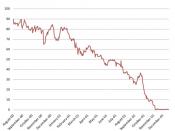Enron Speech
Society is fundamentally based upon performance and profit. It is therefore necessary to impart a sense of corporate social responsibility. The events in the business world over the past few months, such as the bankruptcy of Enron Corporation, have raised one insurmountable question: Should the government regulate corporate accounting? The answer, quite simply is, yes. The ethical approaches of purpose, principle, and consequence are integral components of business social performance; itemizing these contributions involves incorporating the interests of ethics and morality within the corporate structure. These are essential concepts that are often absent from a managerial standpoint. Corporate social responsibility should exist within every company's infrastructure; however, social integrity is not something that is often at the forefront of modern day business dealings. Ethics, business, and society must work in tandem or there is no purpose for any of its existence. Unethical practices are what create a climate of contempt, doubt, and distrust.
I am confident that most of us possess knowledge of what Enron did. The energy giant overstated its profits, lied about the amount of debt that it has, forced employees to purchase its stock without the possibility to sell in order to inflate the market value of the stock, and the board of directors have participated in illegal insider trading. Moreover, The accounting firm Arthur Andersen made all those terrible actions possible.
What interests me is that this is not an isolated event. Numerous companies have very questionable accounting records like Enron's. Some examples include Global Crossing, Xerox, Krispy Kreme Doughnuts, and even IBM. The reason why many individuals do not know about the questionable accounting practices of these other firms is that they are focused on the plight of Enron, the first company to fall, and the largest bankruptcy in corporate America, totaling $48.9 billion.
Many individuals are not aware of how easily Enron could overstate profits and expand into the massive company it was in a few short years. To protect profits in volatile stocks, investors sometimes hedge, which is paying an outside speculator to accept the risk of the stock's price falling for a limited time. In the event that the stock price falls, the speculator pays the stockholder the difference. This is how a hedge should work. Enron's investments in the stock of emerging companies had large paper profits by late 2000. Enron's attempts to protect these profits may have worked on paper, but when Enron's stock began to fall, their hedges fell apart.
Enron's hedges were very uniquely structured. To hedge and inflate its profits, Enron created investment entities named Raptors. Enron gave huge blocks of Enron stock, and stock options to the Raptors. In return, the Raptors promised to pay Enron back and provide the hedge for the value of emerging-company stocks Enron owned. To satisfy accounting standards, it was required for the Raptors to be separate entities from Enron. This in turn reflected on Enron's accounting books in a positive way. These Raptors made it appear that independent speculators protected Enron. Should the price of the emerging-company stock fall, the Raptors would pay the difference by selling the Enron stock and options given to them. This would also artificially raise market capitalization, and earnings of the company. This is the reason why Enron more than tripled in size in less than two years.
Enron intended to profit from the possible fall of the emerging company. However, Enron's hedges failed because the price of the emerging company stocks fell dramatically, and Enron's own stock took a nosedive. The Raptors did not have the money to pay Enron back, so Enron executives injected another $800 million of stock into the Raptors in an attempt to resurrect them. The Raptors sold the additional $800 million worth of stock, which caused the stock price to fall dramatically. Eventually, the illusionary hedge was brought to light. Some Enron executives had already received their original investments back from the Raptors, plus generous profits amounting to over $520 million. The major quandary was that Enron's Raptors were very costly and caused the company to take up large amounts of debt to make it seem that the company was legitimately expanding. This debt continued to spiral out of control until the company could no longer handle it. At that time, Enron filed for chapter 11 bankruptcy. The stock price collapsed; investors and Enron employees were left with next to nothing. In contrast, Enron executives sold their shares and profited at the expense of others.
It seems apparent that Enron executives knew their company would fall about six to nine months before the date they filed for bankruptcy. Therefore, Enron executives sold their stock and stock options. Trading on news not released to the public is considered illegal insider trading. With the assistance of Enron's auditor, Enron began to shred documents dealing with the Raptors. The shedding continued even when Enron was under a subpoena, which is a felony. In addition, Enron executives forced employees to purchase Enron stock and did not allow employees to sell them under any circumstances. By law, an employee can hold no more that 10% of their company's stock in their 401(K) retirement plan. It turns out that many employees' 401(k)s were composed solely of Enron stock. The company was successful in hiding this information from the public by disclosing false information about employee's 401(K) plans. Because of this, many employees lost virtually all of their life savings. One woman who worked for Enron had a 401(k) plan that was valued at approximately $750,000. After the collapse of Enron, she received a check for a mere $20,000. She is going to have a difficult time retiring. A 70-year-old man names Harold Gurston lost over $1.4 million. Because of this, he is unable to retire.
Denys and Scott Watson, senior administrators Enron lost a combined $575,000 for retirement. Furthermore, Scott Watson has been pursuing an MBA at Texas A&M University. Enron had agreed to pay the tuition of $9,000 per semester. He completed one semester and still awaits reimbursement. To make matters worse, he believes that he will need to stop going to school in order to raise money for his family. The actions of Enron's executives were irresponsible, unjust, and manipulative. They gained at the expense of others. This is unquestionably wrong. If the government regulated corporate accounting, none of this would have happened. Even President Bush agrees that there should be regulation of corporate accounting. In his state of the union address, President Bush stated: "Employees who have worked hard and saved all their lives should not have to risk losing everything if their company fails. Through stricter accounting standards and tougher disclosure requirements, corporate America must be made more accountable to employees and shareholders and held to the highest standards of conduct."
Imagine that you have invested your entire savings, $10000, in Enron. Then Dec. 2, 2001 comes along and, Enron files for chapter 11 bankruptcy. You sold your stock at 40 cents per share, taking a staggering 99% loss. A few days later, Enron's accounting practices were revealed. How would you feel if all of your money was taken away? How would you feel when you learned that Enron executives were profiting at your expense? Would you feel enraged, or dumbfounded? Even though this horrible event in the business world occurred, there is a solution to prevent this from ever happening again. The way to solve this problem is to have the government regulate corporate accounting practices. The government would oversee everything the company does, including all transactions, mergers, and insider trading. If anything suspicious were occurring with a company's accounting practices, the government would be able to issue an immediate subpoena and investigate the company before a major problem develops. Companies that are found to be performing any undisclosed or off-the-books transactions would have to pay hefty fines, and an interim board of directors would be elected. This would stop a company from artificially inflating themselves at the expense of others and would make corporate directors think twice before performing any undisclosed transactions.
Many corporate directors do not wish for government regulation of corporate accounting. They claim that this is an invasion of privacy and the government would be receiving inside information. Both reasons are valid. However, this form of invasion of privacy will prevent corporate directors from performing undisclosed transactions. This would also allow the government to see everything that is occurring in a company. This would enable the government to spot any suspicious accounting and stop it before it becomes a major problem. Another reason, corporate directors are against this program is because they consider it costly. Of course, this program would cost the government some money. Nevertheless, without it, investors would be very weary of what is actually going on inside a company and hinder individuals from investing in corporate America entirely. In further support, the losses that investors suffered because of Enron far outweigh the costs of this program. Investors lost over $48.9 billion, which is significantly higher than the $2.5 billion estimated annual cost of the proposed program. If the government does not regulate corporate accounting, more scandals like this would occur. Investors will question everything that a company does, and investors will feel that they are being kept in the dark.
Given the fact that all of humanity must coexist on the same planet, there has to be a modicum amount of consideration with regard to business values. If not, then there would be no sense of tolerance or respect for individual life. People have to abide by laws to ensure proper behavior. Why is it then that companies do not abide by these same rules? Should the decision be made for company and stockholders or personal gain? How many will reap the benefit of individualized attention at the expense of others? By having the government regulate corporate accounting, the honesty of corporate directors will be enforced, decisions will not be made for personal gain at the expense of others, and above all, another Enron will be prevented.



Comments
It's awesome!
0 out of 0 people found this comment useful.